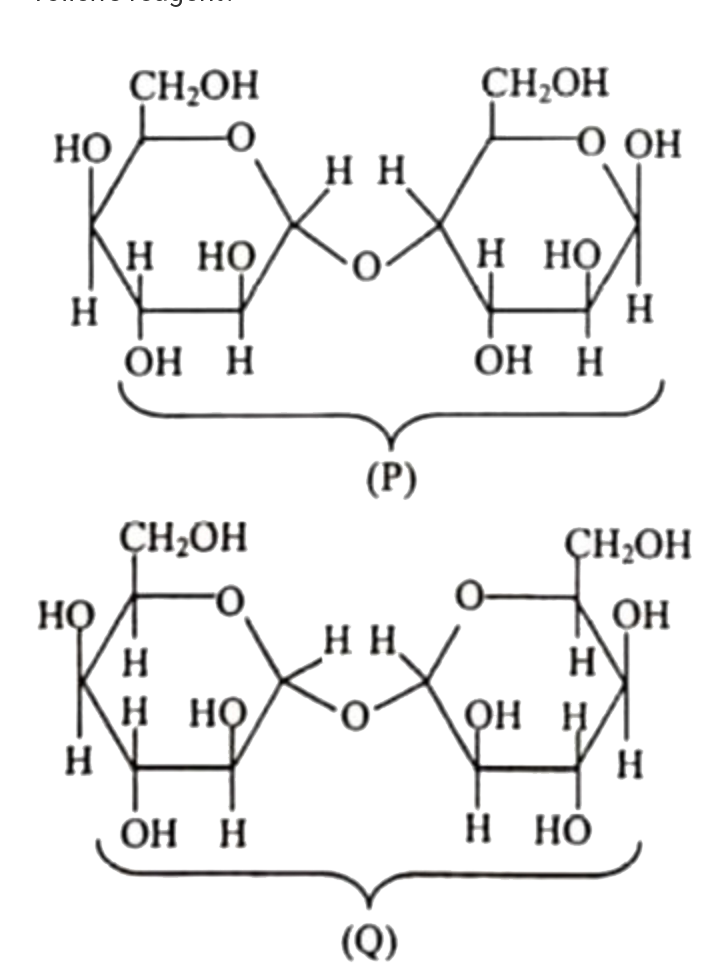which of the following disaccharides will give two molecules of glucose on hydrolysis ?
Maltose
Sucrose
Lactose
None
The correct Answer is:A
To determine which disaccharide will yield two molecules of glucose upon hydrolysis, we need to analyze the hydrolysis products of the given disaccharides.
1. Understand Disaccharides: Disaccharides are carbohydrates composed of two monosaccharide units linked by a glycosidic bond.
2. Analyze Maltose:
- Maltose is composed of two glucose molecules linked together.
- Upon hydrolysis (the addition of water), maltose breaks down into two glucose molecules.
- Therefore, maltose will give two molecules of glucose when hydrolyzed.
3. Analyze Sucrose:
- Sucrose is made up of one glucose molecule and one fructose molecule.
- Hydrolysis of sucrose results in one molecule of glucose and one molecule of fructose.
- Thus, sucrose does not yield two glucose molecules upon hydrolysis.
4. Analyze Lactose:
- Lactose consists of one glucose molecule and one galactose molecule.
- Hydrolysis of lactose results in one molecule of glucose and one molecule of galactose.
- Therefore, lactose also does not yield two glucose molecules upon hydrolysis.
5. Consider the Option "None":
- The option "none" implies that none of the disaccharides yield two glucose molecules, which is incorrect since maltose does.
Conclusion:
The only disaccharide that gives two molecules of glucose on hydrolysis is maltose.
Final Answer:
Maltose is the correct answer.
---
- Maltose is composed of two glucose molecules linked together.
- Upon hydrolysis (the addition of water), maltose breaks down into two glucose molecules.
- Therefore, maltose will give two molecules of glucose when hydrolyzed.
- Sucrose is made up of one glucose molecule and one fructose molecule.
- Hydrolysis of sucrose results in one molecule of glucose and one molecule of fructose.
- Thus, sucrose does not yield two glucose molecules upon hydrolysis.
- Lactose consists of one glucose molecule and one galactose molecule.
- Hydrolysis of lactose results in one molecule of glucose and one molecule of galactose.
- Therefore, lactose also does not yield two glucose molecules upon hydrolysis.
- The option "none" implies that none of the disaccharides yield two glucose molecules, which is incorrect since maltose does.
The only disaccharide that gives two molecules of glucose on hydrolysis is maltose.
Maltose is the correct answer.
Topper's Solved these Questions
- BIOMOLECULESBOOK - CENGAGE BIOLOGY ENGLISHCHAPTER - BIOMOLECULESEXERCISE - ASSERTION-REASONING QUESTIONS
18 Videos
- BIOMOLECULESBOOK - CENGAGE BIOLOGY ENGLISHCHAPTER - BIOMOLECULESEXERCISE - ARCHIVES
26 Videos
- ANIMAL KINGDOMBOOK - CENGAGE BIOLOGY ENGLISHCHAPTER - ANIMAL KINGDOMEXERCISE - Archives
34 Videos
- BREATHING AND EXCHANGE OF GASES BOOK - CENGAGE BIOLOGY ENGLISHCHAPTER - BREATHING AND EXCHANGE OF GASES EXERCISE - Archives
15 Videos
Similar Questions
Which of the following is a disaccharide
View SolutionWhich of the following is a disaccharide
View SolutionWhich of the following are all disaccharides ?
View SolutionWhich of the following is not a disaccharide
View SolutionWhich of the following disaccharides will not reduce tollen's reagent.

View SolutionWhich of the following disaccharide will not reduce Tollen's reagent?

View Solutionwhich is a disaccharide ?
View SolutionWhich of the following disaccharide consists only of glucose unit?
View SolutionWhich of the following disaccharide is not a reducing sugar?
View SolutionWhich one is disaccharide ?
View Solution
